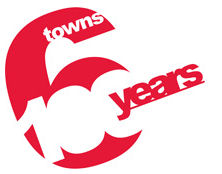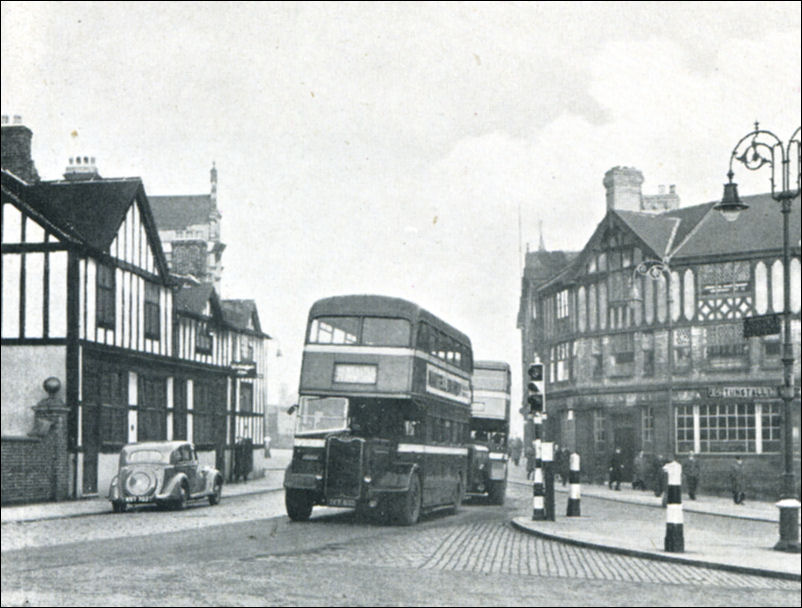![]()
|
|
|
|
|
Stoke-on-Trent - photo of the week |
Advert of the Week
Potworks of the Week
Burslem -
Swan Bank and Moorland Road Junction

|
Scenes in the Six Towns "It is natural that to some extent the six towns now federated as the city of Stoke-on-Trent should have their independent lives and local associations existing side by side with their corporate life and wider civic associations. Here then is a short special reference to each Pottery-town." 1947 City of Stoke-on-Trent Official Handbook |

Burslem - Swan Bank
and Moorland Road Junction c.1947
|
|
Burslem in 1828 "BURSLEM, an ancient town, with a market held for a long period by custom, and subsequently sanctioned by an act of parliament, is about three miles from Newcastle and two from Hanley, entitled to the precedence of other towns in this district, as claiming to be the mother, as it is the metropolis, of the Staffordshire Potteries. In the Doomsday book it is noticed, and spelt therein Barker Deslem. It stands on a rising ground, contains several streets and squares, and extensive and admirably arranged manufactories; is well paved and lighted with gas, under the provisions of an act of parliament, also dictating its police and municipal government, which is vested in a chief constable, chosen annually by the police commissioners. W. Sneyd Esq. is lord of the manor, and hold manorial courts occasionally; and the magistrates hold petty sessions monthly. The market house is a neat and modern structure of brick, situated near the centre of the town; and the town hall is in the Market-place : one part of the building is used as the public office, where the town and parish business is transacted; over this is a large and elegant news-room, exceedingly well supplied with the daily London and provincial papers. The church, dedicated to St. John, is a large modern brick edifice, with an ancient stone tower; the benefice is a rectory, in the patronage of William Adams, Esq. of Cobridge, and the incumbency of the Rev. Edward Whieldon, whose curates are the Rev. Samuel Jones and the Rev. John Buxton Marsden. Another church is the building at Dale hall; and in the parish of Burslem are no fewer than ten meeting houses for dissenters, and a Roman catholic chapel; all these places of worship have Sunday-schools attached; the one adjoining the Wesleyan chapel has been established forty years, and upwards of 1,500 children are instructed under that establishment. Here are besides, a national, catholic day and Sunday-schools, and a free grammar school for a small number of boys. Burslem is the place where the first clod of that great national undertaking the Trent and Mersey canal, was cut, by the late Josiah Wedgwood, Esq. When the 50th anniversary of this memorable event was celebrated, which was a public dinner, various ancient specimens of earthenware were exhibited, descriptive of the progressive state of the manufacture during the last one hundred and fifty years, which were divided into epochs of fifty years, from the butter pot, mentioned by Dr. Plott, down to the time at which the excellent specimens of Queen's, or cream-coloured ware, jasper, &c, left by the late Mr. Wedgwood, were produced. The market days are Monday and Saturday; and the fairs are, the Saturdays before Shrovetide, Easter and Whitsuntide, Saturday on or after June 24th, Saturday before Ember week and December 26th. The parish of Burslem including the township of HULTON ABBEY contained, in 1821, 10,176 inhabitants." Pigot & Co's 1828/9 Directory of Staffordshire
Burslem in 1907 (3 years before federation) "Burslem is frequently referred to as the Mother Town of the Potteries, because the earthenware and china industries of North Staffordshire originated there. The population has grown from 1,800 in 1738 to about 40,000 at the present time. Josiah Wedgwood's factories were originally situated in Burslem (until they were removed to Etruria), and the town to-day contains the factories of many leading firms. The Sneyd and Grange Collieries and Parker's Brewery may also be mentioned. There are also engineering works. Burslem is well supplied with shops, and possesses a handsome Town Hall (opened in January, 1857), and admirable markets (Monday, Wednesday, and Saturday). The principal thoroughfares are Waterloo-road (running south and north, and connecting Hanley and Tunstall) and Moorland-road and Newcastle street, running from Smallthorne, through the town, and on to Longport (N.S.R. main line) and Wolstanton. Burslem Station is on the loop-line of the N.S.R.. Burslem has always been noted for the enterprising spirit of its public representatives and its business men, and the earnestness of its religious life; and special attention has been paid to the development of education, particularly in the application of art teaching to the potting trade. The Wedgwood Institute, containing the Free Library and Museum and Science and Art Schools, was erected as a memorial to Josiah Wedgwood, mainly through the efforts of the late Mr. William Woodall, M.P. The foundation- stone was laid by Mr. Gladstone on October 26th, 1863. The late Mr. Thomas Hulme, who took a great interest in the Wedgwood Institute, gave a site opposite the Institute for a new School of Art, and this is to be opened in the present year. The town has its own gas and electricity undertakings, Gymnasium and Volunteer Drill Hall, a Cemetery, admirable Baths, a new Fever Hospital, a Park, a refuse destructor at the Electricity Works, and nearly £40,000 is now being spent on new sewage disposal works. There is also the Haywood Hospital. Water is supplied by the Potteries Waterworks Company. Burslem supplies Tunstall with electricity, and Wolstanton with gas and electricity, but the Wolstanton Council is about to provide its own gas supply. The Miners' Hall, the headquarters of the N.S. Miners' Association, and the residence of Mr. Enoch Edwards, the borough member, is in Burslem. John Wesleyfrequently visited Burslem, and in addition to several churches, the Wesleyan, Primitive Methodist, Methodist New Connexion, and Congregational bodies, amongst others, have noteworthy places of worship. From "time immemorial," a fair called "Burslem Wakes" was held in the borough, consisting of shows and stalls standing in the Market-place, " commencing on the Saturday before the first Sunday after the 24th June, and continuing on the Sunday, Monday, and Tuesday following the said Saturday, being originally, it is believed, the feast of the dedication of the parish church of St. John the Baptist." On the 30th April, 1870, the Burslem Corporation petitioned the Home Secretary to abolish this fair, and it was abolished accordingly, the Tunstall " Wakes " being abolished at the same time. Since then, the shows have been allowed to stand in the Market-place of Burslem by resolution of the Council, and last year the Council resolved that spaces in the Marketsquare should not be let for shows again. There is a Board of Guardians for the Burslem and Wolstanton district, of which Mr. George K. Downing is the chairman and Mr Joseph A. Lowndes is the clerk.; the offices are in Burslem. A new Post Office was erected in Burslem recently, and the Corporation owns the site adjoining it, upon which it is proposed to erect Municipal Buildings. But though the Corporation has incurred a large expenditure during the past few years on new undertakings, the financial position of the town is regarded as favourable, as some old loans are being extinguished. The Burslem Association for the Prosecution of Felons furnishes the occasion for an annual dinner, which is attended by most of the leading townspeople - commonly called the Felons' dinner. Captain Russell commands the local Volunteer Corps."
1907 Staffordshire Sentinel 'Business Reference Guide to The Potteries, Newcastle & District'
|
| Burslem
"Burslem holds the affectionate title of the "Mother Town". It has a proud heritage of pottery and ceramics, and was the birthplace of perhaps the most famous potter of all time, Josiah Wedgwood. Burslem became one of the busiest centres for the Trent and Mersey Canal network during the 19th Century, as it was the main method of transport for the ceramic goods the town produced. Itís other famous son is the 15 time World Darts Champion Phil Taylor."
|